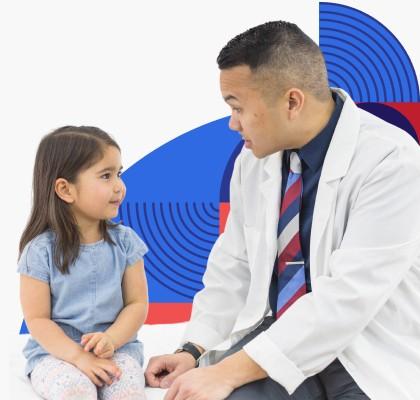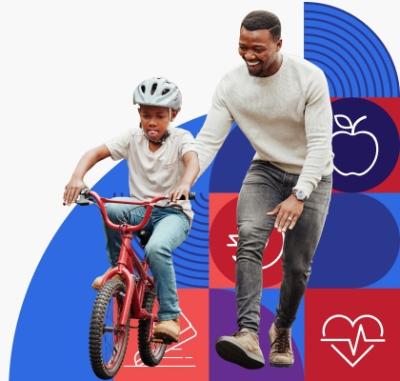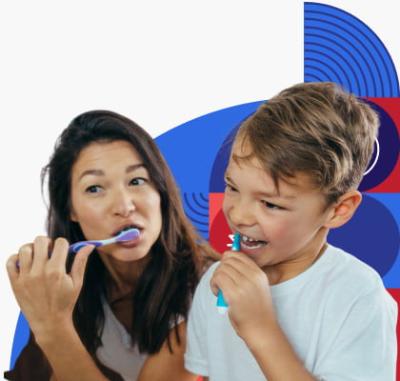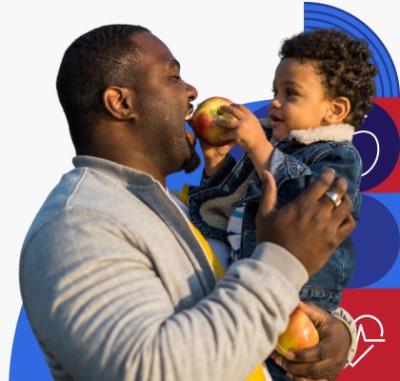Doctor Visits
Make the Most of Your Child’s Visit to the Doctor (Ages 1 to 4 Years)

The Basics
Overview
Young children need to see the doctor or nurse for a “well-child visit” 7 times between ages 1 and 4 years.
A well-child visit (also called a checkup) is when you take your child to the doctor to make sure they’re healthy and developing normally. This is different from visits for sickness or injury.
At a well-child visit, the doctor or nurse can help catch any problems early, when they may be easier to treat. You’ll also have a chance to ask questions about things like your child’s behavior, eating habits, and sleeping habits.
Learn what to expect so you can make the most of each visit.
Well-Child Visits
How often do I need to take my child for well-child visits?
Young children grow quickly, so they need to visit the doctor or nurse regularly to make sure they’re healthy and developing normally.
Children ages 1 to 4 years need to see the doctor or nurse when they’re:
- 12 months old (1 year)
- 15 months old (1 year and 3 months)
- 18 months old (1 year and 6 months)
- 24 months old (2 years)
- 30 months old (2 years and 6 months)
- 3 years old
- 4 years old
If you’re worried about your child’s health, don’t wait until the next scheduled visit — call the doctor or nurse right away.
Child Development
How do I know if my child is growing and developing on schedule?
Your child’s doctor or nurse can help you understand how your child is developing and learning to do new things — like walk and talk. These are sometimes called “developmental milestones.”
Every child grows and develops differently. For example, some children will take longer to start talking than others. Learn more about child development.
At each visit, the doctor or nurse will what new things your child is learning to do. They may also ask how you’re feeling and if you need any support.
Ages 12 to 18 Months
By age 12 months, most kids:
- Stand by holding on to something
- Walk with help, like by holding on to the furniture
- Call a parent "mama," "dada," or some other special name
- Look for a toy they've seen you hide
Check out this complete list of milestones for kids age 12 months.
By age 15 months, most kids:
- Follow simple directions, like "Pick up the toy"
- Show you a toy they like
- Try to use things they see you use, like a cup or a book
- Take a few steps on their own
Check out this complete list of milestones for kids age 15 months.
By age 18 months, most kids:
- Make scribbles with crayons
- Look at a few pages in a book with you
- Try to say 3 or more words besides “mama” or “dada”
- Point to show someone what they want
- Walk on their own
- Try to use a spoon
Check out this complete list of milestones for kids age 18 months.
Ages 24 to 30 Months
By age 24 months, most kids:
- Notice when others are hurt or upset
- Point to at least 2 body parts, like their nose, when asked
- Try to use knobs or buttons on a toy
- Kick a ball
Check out this complete list of milestones for kids age 24 months.
By age 30 months, most kids:
- Name items in a picture book, like a cat or dog
- Play next to or with other kids
- Jump off the ground with both feet
- Take some clothes off by themselves, like loose pants or an open jacket
Check out this complete list of milestones for kids age 30 months.
Ages 3 to 4 Years
By age 3 years, most kids:
- Calm down within 10 minutes after you leave them, like at a child care drop-off
- Draw a circle after you show them how
- Ask “who,” “what,” “where,” or “why” questions, like “Where is Daddy?”
- Use a fork
Check out this complete list of milestones for kids age 3 years.
By age 4 years, most kids:
- Avoid danger — for example, they don’t jump from tall heights at the playground
- Pretend to be something else during play, like a teacher, superhero, or dog
- Draw a person with 3 or more body parts
- Catch a large ball most of the time
Check out this complete list of milestones for kids age 4 years.
Take Action
Get Ready
Take these steps to help you and your child get the most out of well-child visits.
Gather important information.
Take any medical records you have to the appointment, including a record of vaccines (shots) your child has received.
Make a list of any important changes in your child’s life since the last doctor’s visit, like a:
- New brother or sister
- Serious illness or death in the family
- Separation or divorce — or a parent spending time in jail or prison
- Change in childcare
Use this tool to keep track of your child’s family health history. This information will help your doctor or nurse know if your child is at risk for certain health problems.
Ask other caregivers about your child.
Before you visit the doctor, talk with others who care for your child, like a grandparent, daycare provider, or babysitter. They may be able to help you think of questions to ask the doctor or nurse.
What about cost?
Under the Affordable Care Act, insurance plans must cover well-child visits. Depending on your insurance plan, you may be able to get well-child visits at no cost to you. Check with your insurance company to find out more.
Your child may also qualify for free or low-cost health insurance through Medicaid or the Children’s Health Insurance Program (CHIP). Learn about coverage options for your family.
If you don’t have insurance, you may still be able to get free or low-cost well-child visits. Find a health center near you and ask about well-child visits.
To learn more, check out these resources:
Ask Questions
Make a list of questions you want to ask the doctor.
Before the well-child visit, write down a few questions you have. This visit is a great time to ask the doctor or nurse any questions about:
- A health condition your child has (like asthma or an allergy)
- Changes in sleeping or eating habits
- How to help kids in the family get along
Here are some questions you may want to ask:
- Is my child up to date on vaccines?
- How can I make sure my child is getting enough physical activity?
- Is my child at a healthy weight?
- How can I help my child try different foods?
- What are appropriate ways to discipline my child?
- How much screen time is okay for young children?
Take notes so you can remember the answers later.
Ask what to do if your child gets sick.
- Make sure you know how to get in touch with a doctor or nurse when the office is closed.
- Ask how to reach the doctor on call — or if there's a nurse information service you can call at night or during the weekend.
What to Expect
Know what to expect.
During each well-child visit, the doctor or nurse will ask you questions about your child, do a physical exam, and update your child's medical history. You'll also be able to ask your questions and discuss any problems you may be having.
The doctor or nurse will ask questions about your child.
The doctor or nurse may ask about:
- Behavior: Does your child have trouble following directions?
- Health: Does your child often have stomachaches or other kinds of pain?
- Activities: What types of pretend play does your child like? What toys or other things do they most like playing with?
- Eating habits: What does your child eat on a normal day?
- Family: Have there been any changes in your family since your last visit?
- Learning: What’s something new your child learned recently?
They may also ask questions about safety, like:
- Does your child always ride in a car seat in the back seat of the car?
- Does anyone in your home have a gun? If so, is it unloaded and locked in a place where your child can’t get it?
- Is there a swimming pool or other water around your home? Is there a locked door or gate to keep your child from getting to the pool without an adult?
- What steps have you taken to childproof your home? Do you have gates on stairs and latches on cabinets?
- Does everyone who cares for your child know when and how to call Poison Control (1-800-222-1222)?
Your answers to questions like these will help the doctor or nurse make sure your child is healthy, safe, and developing normally. Be honest, even if you’re worried you’re doing something wrong — the doctor or nurse is there to help you.
Physical Exam
The doctor or nurse will also check your child’s body.
To check your child’s body, the doctor or nurse will:
- Measure your child’s height and weight
- Check your child’s blood pressure
- Check your child’s vision
- Check your child’s body parts (this is called a physical exam)
- Give your child any vaccines they need
Learn more about your child’s health care:
Content last updated October 21, 2025
Reviewer Information
This information on well-child visits was adapted from materials from the Centers for Disease Control and Prevention and the National Institutes of Health.
Reviewed by:
Sara Kinsman, MD, PhD
Director, Division of Child, Adolescent, and Family Health
Maternal and Child Health Bureau
Health Resources and Services Administration (HRSA)


